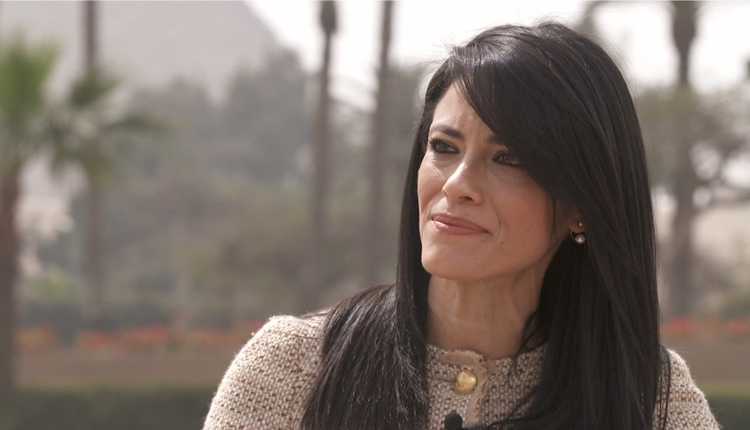41
Egypt’s Minister of International Cooperation Rania Al-Mashat chaired a high- level meeting with the heads of the four Results Groups of the United Nations Partnership Development Framework (UNPDF) Steering Committee.
The meeting was attended by Minister of Planning and Economic Development Hala El-Said, Minister of Environment Yasmin Fouad, Minister of Social Solidarity Nevein Elkabbag, President of the National Council for Women Maya Morsi, and UN Resident Coordinator in Egypt Richard Dictus.
The meeting was also attended by UNDP Resident Representative in Egypt Randa Abulhosn, Menghestab Haile, United Nations World Food Program (WFP) Representative and Country Director Nasredin Hag Elamin, and UN Women Head of Office Gielan Elmeseiri.
The meeting discussed a unified national cooperation vision with the UN to face the socioeconomic implications of the COVID-19 outbreak under the UN Partnership Development Framework (UNPDF) 2018-2022, which aims to support the Egyptian government’s vision and efforts to achieve its national development agenda amid the COVID-19 crisis.
The UNPDF, worth $1.2 billion, is based on four strategic pillars, namely inclusive economic development, social justice, women’s empowerment, and environmental sustainability and natural resources management.
Al-Mashat said that her ministry is working closely with UN agencies to alleviate the socioeconomic impacts of the COVID-19 outbreak, which would contribute to ensuring that development efforts are not interrupted and are on the right track to achieve their aspired goals, especially the implementation of the sustainable development goals (SDGs).
She added that the UNPDF was drafted based on the outcomes of national consultations with 400 stakeholders from the government, the UN, civil society and the private sector.
Al-Mashat pointed out that the framework is in line with the government’s vision, the country’s social and economic programme and with the international cooperation ministry’s new partnership strategy with development partners, which is based on three main pillars including People at the Core, Projects in Action and Purpose as the Drive, which addressed developmental partnership aiming at achieving SDGs.
Al-Mashat expounded that the Inclusive Economic Development pillar focused on achieving the agreed upon goals targeting sustainable inclusive economic development, creating job opportunities and capacity building.
The Social Justice pillar focused on national efforts dedicated to controlling population growth and to ensure access to public services, such as social protection, health, nutrition and education.
The Women’s Empowerment pillar aimed to enhance women capabilities and their engagement in leadership positions and in several other economic activities, in addition to supporting their access to education and labour opportunities.
The Environmental Sustainability and Natural Resources Management pillar sought the effective and constructive management of Egypt’s natural resources and mitigating environmental risks as well as climate change risks.
She stressed that it was agreed upon during the meeting to continue the strategic dialogue between the government and the UN to enhance ongoing coordination in order to reach a comprehensive plan for cooperation towards mitigating the socio-economic and health implications of the COVID-19 outbreak.
I was also agreed upon to continue dialogue to address the post-COVID-19 recovery by joining efforts to mitigate the impact on the economy and to support infrastructure, digital transformation and financial inclusiveness for women, which would contribute to creating more job opportunities and ensure the ongoing achievement of SDGs.
Meanwhile, Minister Hala El-Said said the government’s response, whether to reduce losses or mitigate the negative impact of COVID-19, is very solid, adding that the full support of Egypt’s development partners during this phase is extremely important to mitigate the risks of the COVID-19 crisis and to prepare for the post-COVID-19 phase.
She clarified that the localisation of the SDGs in the governorates is crucial to maximise the benefit of the comparative advantages of the Egyptian governorates and regions, in addition to achieving inclusiveness, sustainable growth and balanced regional development as one of the main pillars of Egypt’s 2030 vision.
Nevine El-Kabbag presented the priorities of her ministry to mitigate the implications of the pandemic, whether on the level of social protection, social care or development initiatives, by extending social security networks to include additional households, to include the poorest, most vulnerable and most affected by the crisis, such as unofficial workers, the elderly, those on pension, children without social care, at risk women, those with disabilities and those living in unofficial and remote rural areas.
“The WFP’s immediate focus is to support the government to upgrade the national social protection system to protect vulnerable families with cash transfers primarily targeting families of casual and informal sector workers and female-headed households and other vulnerable communities. I would like to congratulate the Egypt’s government for its exemplary response to mitigate the socioeconomic impacts of COVID-19 on the Egyptian people,” said Menghestab Haile, Country Director of the WFP.
“On behalf of the Women’s Results Group, I would like to underscore our commitment to supporting the GoE in protecting and sustaining the gains already made to accelerate the achievement of Women’s Empowerment, notably in the area of women’s leadership and political participation and women’s economic participation, which the current crisis risks rolling back. In addition, we remain committed to further improving our reporting on results and to ensuring alignment in our approaches as a Results Group,” said Gielan Elmessiri, head of the UN Women Egypt Country Office.
Nasreddin Hag Elamin, FAO Representative in Egypt, said that there is a need to intensify work in a broader and wider manner between the UN organisations working in Egypt, the Egyptian government and all relevant parties, to develop policies and programs in the areas of climate change, food systems, and water issues in a way that enables Egypt to face COVID-19 challenges and contributes to achieving the SDGs.
He praised the efforts and the precautionary measures undertaken by Egypt in facing the challenges of the coronavirus crisis, which have contributed greatly to mitigating the impact of this crisis.
